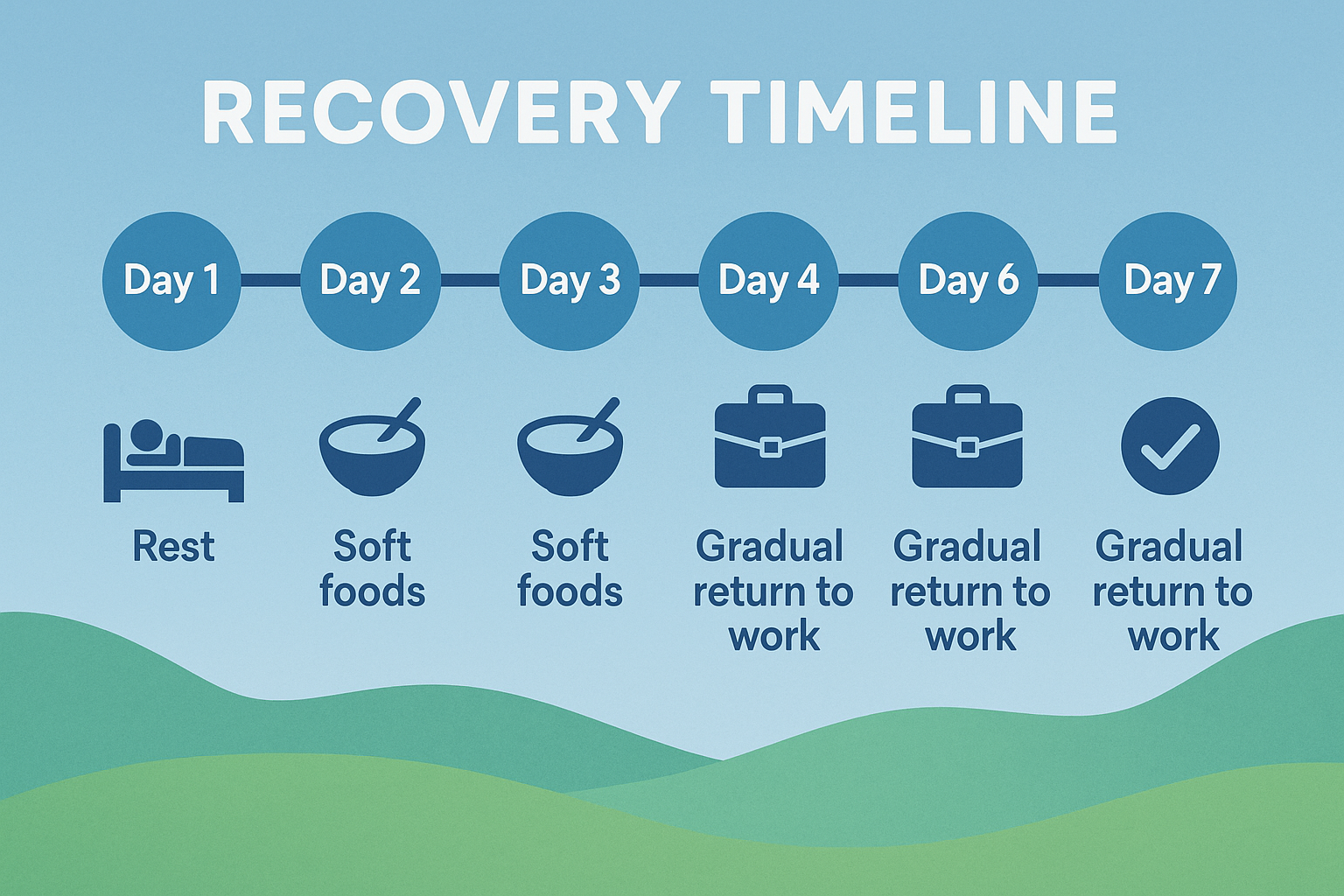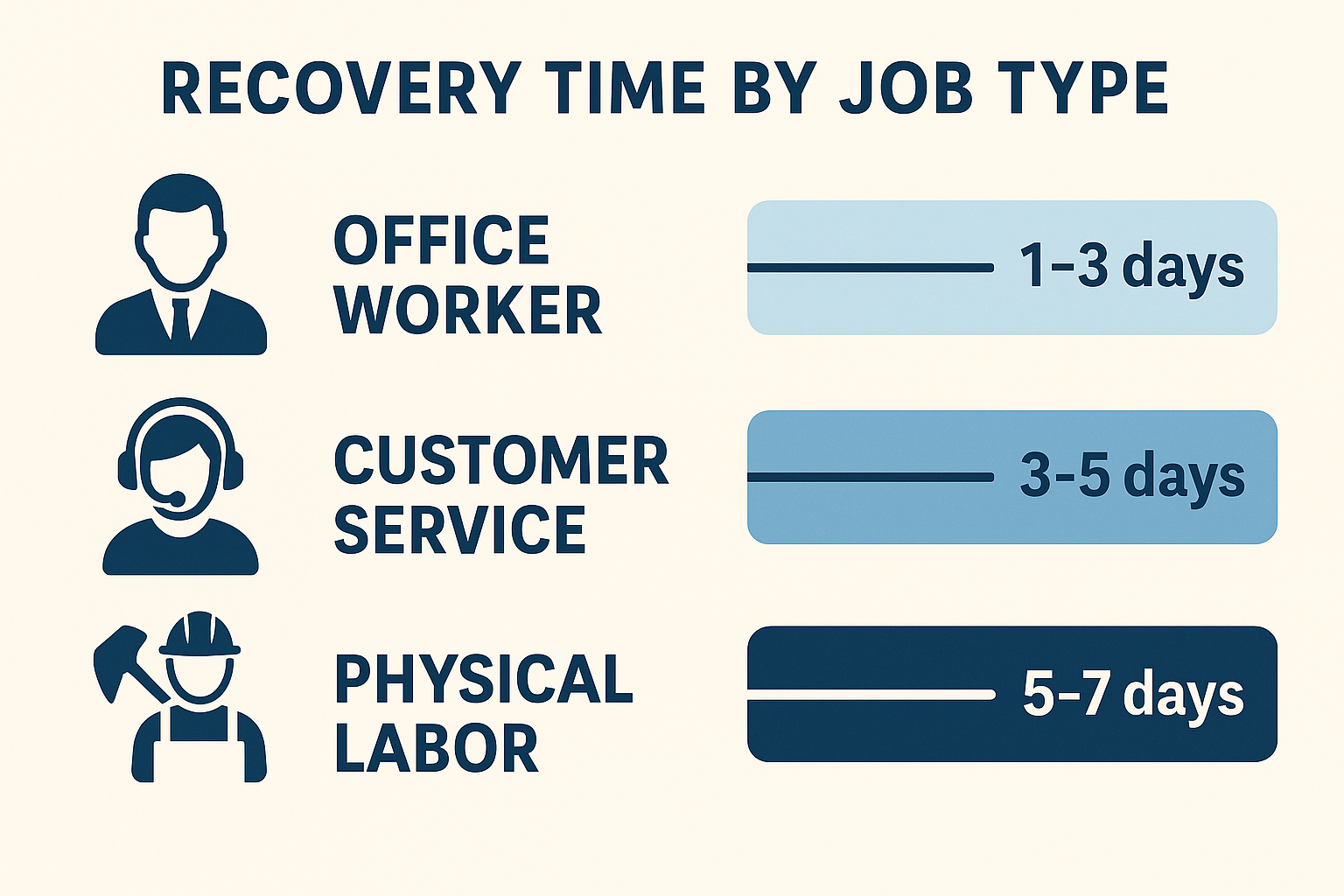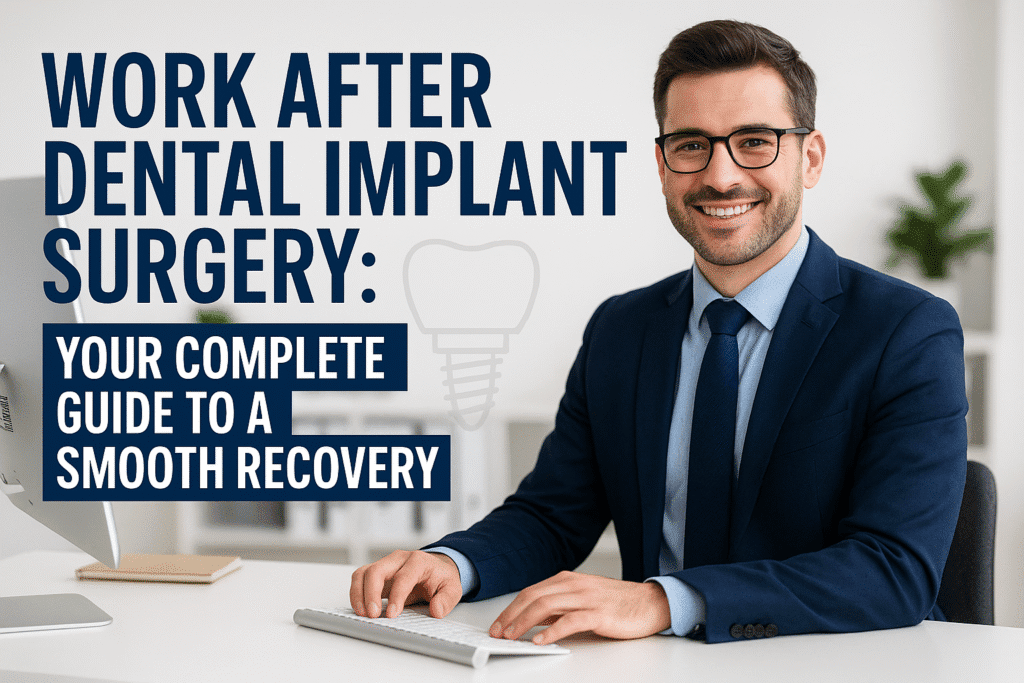Picture this: you’ve just invested in your future smile with dental implant surgery, and now you’re wondering when you can get back to your normal routine. The good news? With proper planning and care, returning to work after dental implant surgery doesn’t have to derail your professional life or compromise your healing process.
Whether you’re a Dallas professional juggling meetings or someone who works with their hands, understanding what to expect can help you plan your recovery timeline and ensure the best possible outcome for your new smile.
Key Takeaways
- Most people can return to desk work within 1-3 days after dental implant surgery, while physical jobs may require 5-7 days off
- Swelling and discomfort peak 48-72 hours after surgery, so plan your most important work activities accordingly
- Your job type significantly impacts recovery time – office workers recover faster than those in physically demanding roles
- Proper preparation and communication with your employer can make your transition back to work seamless
- Following post-operative instructions is crucial for both healing and maintaining your professional responsibilities
Understanding the Dental Implant Recovery Timeline
When planning your return to work after dental implant surgery, it’s essential to understand how your body heals. The initial recovery period varies based on several factors, but here’s what you can generally expect:
Immediate Post-Surgery (0-24 Hours)
The first day after your dental implant procedure is typically the most challenging. You’ll likely experience:
- Numbness from local anesthesia (lasting 2-8 hours)
- Initial swelling and tenderness
- Some bleeding or oozing at the implant site
- Fatigue from the procedure and any sedation
Days 2-3: Peak Discomfort Period
This is when most patients experience the height of their recovery symptoms:
- Maximum swelling around the surgical site
- Increased discomfort that pain medication should manage effectively
- Possible bruising around the jaw and face
- Dietary restrictions limiting you to soft foods
Days 4-7: Gradual Improvement
By the end of the first week:
- Swelling begins to subside noticeably
- Pain becomes more manageable
- Energy levels start returning to normal
- You can gradually introduce more foods into your diet
Expert Tip: “Most of my patients are surprised by how manageable the recovery process is when they follow our post-operative guidelines. The key is setting realistic expectations and planning ahead.” – Dallas Dental Implant Specialist
Factors That Affect Your Return to Work Timeline

Type of Work You Do
Office/Desk Work (1-3 days off)
If your job involves primarily sitting at a computer, taking calls, or attending meetings, you can typically return to work relatively quickly. However, consider:
- Your ability to concentrate while managing discomfort
- Whether you can take pain medication and remain productive
- The availability of soft foods for lunch breaks
Physical Labor (5-7 days off)
Jobs requiring heavy lifting, bending, or strenuous activity need more recovery time because:
- Physical exertion can increase bleeding and swelling
- Elevated heart rate may disrupt the healing process
- Risk of injury to the surgical site is higher
Customer-Facing Roles (3-5 days off)
If your work involves extensive speaking or public interaction:
- Swelling may affect your appearance temporarily
- Speech might be slightly affected initially
- Consider your comfort level with explaining any visible changes
Number of Implants Placed
The extent of your surgery directly impacts your recovery timeline:
- Single implant: Minimal impact on daily activities
- Multiple implants: Increased swelling and longer recovery
- Full mouth reconstruction: May require 1-2 weeks off work
Your Overall Health and Age
Younger, healthier patients typically experience:
- Faster healing times
- Less post-operative swelling
- Quicker return to normal activities
Patients with certain health conditions may need extended recovery periods, so discuss your specific situation with your dental team.
🦷 Work Return Timeline Calculator
Preparing for Work After Dental Implant Surgery
Before Your Surgery
Communicate with Your Employer 📞
- Discuss your planned time off in advance
- Explain that dental implant surgery is a medical procedure
- Ask about work-from-home options if applicable
- Consider scheduling surgery on a Thursday or Friday for weekend recovery
Stock Up on Work-Friendly Supplies
- Soft foods that are easy to eat during lunch breaks
- Pain medication (discuss timing with your dentist)
- Ice packs for managing swelling
- Extra tissues and water for hydration
Plan Your Workload
- Complete urgent projects before surgery
- Delegate time-sensitive tasks
- Set up out-of-office messages
- Reschedule important meetings for after your recovery
Day of Surgery Considerations
Most dental implant procedures are performed with local anesthesia, but if you receive sedation:
- Arrange transportation to and from the appointment
- Plan to take the rest of the day off
- Avoid making important decisions while medication effects wear off
Managing Work Responsibilities During Recovery

Working from Home Options
If your job allows remote work, this can be an excellent compromise during your initial recovery. Benefits include:
- Flexibility to manage pain medication timing
- Comfort of your own environment
- Privacy while managing swelling or dietary restrictions
- Easy access to ice packs and soft foods
Modifying Your Work Schedule
Consider these temporary adjustments:
- Shorter workdays during the first week
- Flexible lunch breaks for medication and soft meals
- Reduced meeting schedule if speaking is uncomfortable
- Postponed travel plans for the first week
Eating at Work During Recovery
Maintaining proper nutrition while following post-operative dietary guidelines at work requires planning:
Week 1: Soft Foods Only
- Smoothies and protein shakes
- Yogurt and pudding
- Soup (lukewarm, not hot)
- Mashed potatoes
- Scrambled eggs
Week 2-4: Gradual Food Introduction
- Pasta and soft rice dishes
- Cooked vegetables
- Soft fruits like bananas
- Fish and tender chicken
Remember: Avoid using straws, as the suction can disrupt healing and potentially cause dry socket.
Signs You Should Stay Home Longer
While most people can return to work within a few days, certain symptoms indicate you need more recovery time:
Physical Warning Signs ⚠️
- Excessive bleeding that doesn’t stop with gentle pressure
- Severe swelling that worsens after day 3
- Intense pain not managed by prescribed medication
- Fever above 101°F (38.3°C)
- Signs of infection (pus, unusual odor, increased redness)
Functional Limitations
- Inability to concentrate due to pain or medication
- Difficulty speaking clearly for customer-facing roles
- Extreme fatigue affecting job performance
- Nausea or dizziness from pain medication
If you experience any of these symptoms, contact your dental team immediately and consider extending your time off work.
Tips for a Successful Return to Work

Your First Day Back
Start Slowly 🐌
- Ease into your normal routine
- Take breaks as needed
- Keep soft foods and water readily available
- Have a backup plan if you need to leave early
Dress Comfortably
- Choose clothing that doesn’t put pressure on your face
- Avoid tight collars or accessories near your jawline
- Consider bringing a small pillow for car rides if you’re still tender
Managing Pain and Medication at Work
Timing Your Medication
- Take pain medication with food when possible
- Set phone reminders for consistent dosing
- Keep medication in a secure, private location
- Understand how medication affects your concentration and decision-making
Natural Pain Management at Work
- Apply ice packs during breaks (15 minutes on, 15 minutes off)
- Practice gentle jaw exercises as recommended by your dentist
- Stay hydrated throughout the day
- Use a supportive pillow if you need to rest
Protecting Your Investment
Your dental implants represent a significant investment in your oral health and confidence. Protecting them while returning to work involves:
Avoiding Workplace Hazards
- Be extra cautious in environments with flying debris
- Avoid extremely hot beverages for the first week
- Don’t use your teeth as tools (opening packages, etc.)
- Consider a mouth guard if you work in high-risk environments
Maintaining Oral Hygiene
- Follow your dentist’s specific cleaning instructions
- Keep a travel oral care kit at work
- Rinse gently with salt water after meals
- Avoid vigorous brushing near the implant site initially
Long-Term Success: Beyond the First Week
Weeks 2-4: Gradual Normalization
As you settle back into your work routine, you’ll notice:
- Increased energy levels returning to normal
- Improved comfort with a wider variety of foods
- Reduced swelling and return to normal appearance
- Better sleep quality as discomfort decreases
The Importance of Follow-Up Appointments
Don’t let work commitments interfere with your scheduled follow-up visits. These appointments are crucial for:
- Monitoring healing progress
- Adjusting your oral care routine
- Addressing any concerns early
- Planning the next phase of treatment (if applicable)
Many dental offices, including those offering full mouth implant packages, understand the demands of professional life and can often accommodate early morning or late afternoon appointments.
Special Considerations for Different Professions

Healthcare Workers
If you work in healthcare, you face unique challenges:
- Infection control protocols may require special considerations
- Physical demands of patient care need careful management
- Mask wearing may cause initial discomfort around the surgical site
- Long shifts require careful medication timing
Discuss your specific work environment with your dental team to develop a personalized return-to-work plan.
Teachers and Public Speakers
Professionals who rely heavily on verbal communication should consider:
- Voice rest when possible during the first few days
- Hydration is especially important for vocal health
- Backup plans for days when speaking is more challenging
- Gradual increase in speaking demands
Food Service Workers
Those working in restaurants or food service face additional considerations:
- Temperature sensitivity around hot cooking equipment
- Dietary restrictions while surrounded by various foods
- Physical demands of standing and moving quickly
- Hygiene requirements that may affect oral care timing
Financial Considerations and Work Planning
Balancing Recovery with Income
Taking time off work for dental implant surgery involves financial planning:
Paid Time Off
- Use vacation days or personal time strategically
- Consider sick leave policies for medical procedures
- Plan surgery timing around your company’s busy seasons
Flexible Work Arrangements
- Negotiate temporary work-from-home options
- Explore compressed work schedules
- Consider part-time arrangements during initial recovery
For those concerned about the financial investment, exploring full mouth dental implant payment plans can help make treatment more accessible while managing work-related income considerations.
Creating Your Personal Recovery Plan

Timeline Checklist ✅
Pre-Surgery (1 week before)
- [ ] Notify employer and arrange time off
- [ ] Complete urgent work projects
- [ ] Stock up on soft foods and supplies
- [ ] Arrange transportation for surgery day
Day of Surgery
- [ ] Take the full day off
- [ ] Follow all pre-operative instructions
- [ ] Have someone available to drive you home
- [ ] Begin following post-operative care guidelines
Days 1-3
- [ ] Focus on rest and healing
- [ ] Manage pain and swelling as directed
- [ ] Maintain soft food diet
- [ ] Monitor for any concerning symptoms
Days 4-7
- [ ] Gradually increase activity levels
- [ ] Consider returning to desk work if comfortable
- [ ] Continue following dietary restrictions
- [ ] Attend any scheduled follow-up appointments
Week 2 and Beyond
- [ ] Resume normal work activities
- [ ] Gradually expand diet as healing progresses
- [ ] Maintain excellent oral hygiene
- [ ] Continue protecting your investment
When to Seek Professional Guidance
While this guide provides general recommendations for returning to work after dental implant surgery, every patient’s situation is unique. Contact your dental team if you have specific concerns about:
- Your particular work environment and its impact on healing
- Medication timing around work schedules
- Managing specific job-related challenges during recovery
- Questions about your healing progress
Remember, the team at Dallas dental implant specialists is there to support you throughout your entire journey, including helping you navigate the return to your professional responsibilities.
Conclusion
Returning to work after dental implant surgery doesn’t have to be stressful or complicated. With proper planning, realistic expectations, and good communication with both your employer and dental team, you can successfully balance your professional responsibilities with your healing process.
Your next steps:
- Schedule a consultation to discuss your specific work situation and recovery timeline
- Plan your surgery timing around your work schedule and responsibilities
- Prepare your workplace with necessary supplies and arrangements
- Follow post-operative instructions carefully to ensure optimal healing
- Stay in communication with your dental team throughout the recovery process
Remember, dental implants are an investment in your long-term oral health and confidence. Taking the time to heal properly now will ensure you can smile with confidence in all your professional endeavors for years to come. Your journey to a better smile should enhance, not hinder, your career success.
If you’re ready to take the next step toward permanent teeth in a day or want to learn more about full mouth teeth replacement costs, our Dallas team is here to help you plan a treatment approach that works with your lifestyle and professional commitments.


Leave a Reply
Share your thoughts or ask a question about dental implants. Your email address will not be published.